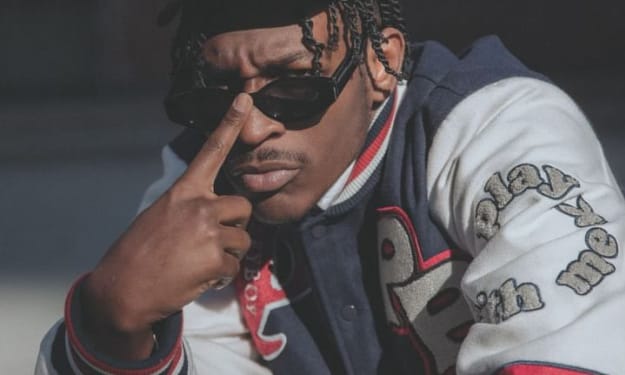
For over two decades America has known the case of Baby Byron. He was born two months premature and addicted to cocaine and heroin in 1992. His mother left him at the hospital and placed under the care of a white couple. A racially motivated custody battle ensued that divided the nation and got the attention of the NAACP, ACLU, and the Supreme Court.
Baby Byron and his family were guests on CNN, The Montel Williams Show, Ricki Lake, and his story even inspired a book and Hollywood movie starring Halle Berry.
Today Baby Byron is all grown up and has been sharing his story through media interviews and with his new solo album “Drugz Before the Flight 2”.
Byron is apart of a hip hop music duo A Kid Called Gauwd , a rap group Co-founded by Ase Snefru & Baby Byron.
Vocal readers please enjoy our interview!
Tammy Reese:
What inspired you to get into the entertainment industry?
Byron:
Ever since I was a kid I always felt I was involved with music. I was born in 1992 so any kid growing up in the 90s or early 2000s was inspired by hip-hop. That's the era of 50 Cent, Eminem, and all the other dope artists from that time. When I first heard the song "Grindin" by The Clipse, that is when I knew I wanted to be a rapper too. Everyone was doing that beat on the tables, it was a universal freestyle beat for that time period.
Tammy Reese:
What are some memorable moments in your career so far?
Byron:
Things that Ase Snefru and I achieved with A Kid Called Gauwd is that we got to explore and see other people's reactions to our music. That probably is one of our biggest accomplishments so far. We are still early in our career, but it was great that we got to experience going to California to do shows out there. Also we had a meeting with Warner Brothers. We make music because we love it, and we enjoy what we do.
Tammy Reese:
What obstacles have you overcome in your personal life?
Byron:
For those who are not familiar with my story, Baby Byron is a story of a time period and relates to a generation to some degree. As I stated, I was born in 1992, the significance to 1992 was the time of the crack epidemic. That was a specific era and serious time for people of color in the urban community. My story comes from the crack epidemic. I was considered at one point the world's famous crack baby. If you had put a name or a face to what the epidemic was at that time, it would have been the Baby Byron case. It would have been me at the time.
Tammy Reese:
How did it make you feel when you got older and learned more about your case, especially being that your case gained national media coverage?
Byron:
Believe it or not, I was always aware of the story and case. I didn't get a chance to not know it. I got more clarity when I got older. It's something that was apart of my life for such a long period of time. When I found out that anyone was impacted by my story I was about 17. That's when I had my firstborn child. Around then I spoke to an older gentleman who was familiar with my story, he told me what he remembered about my case and that it was one of the first interracial custody battles of that time.
Tammy Reese:
What do you think about the film "Losing Isaiah" starring Halle Berry being inspired by your story?
Byron:
I would say our story, not much of just my story. Though most people would like to put my name to it. I say this because at the time I was born was the premiere of the Baby Byron story. I had drugs in my system and things happened so fast that foster care immediately put me in the placement of a white family. The news caught wind my case locally, it then exploded regionally, and then nationally. If you were national news back then you would've been talked about for months or a year, depending. How news is transferred now was totally different back then, there was no social media. The press covered the custody battle for years. The "Losing Isaiah" film came out in 1995, so people were like it has to be or close to reality to my story.
I think Hollywood has a habit of instead of saying they got a story from one particular person, they will combine like 5 stories and come out with something, but that's just Hollywood. Hollywood does films mirroring the time period. The film in my opinion was mirroring my life, but also the life of crack babies around America, mixed with any close to publications at the time. I won't say the "Losing Isaiah" movie is about me, but what I will say is the film piggybacked off of my story of the true events of my life.
Tammy Reese:
What life lessons have you learned from your story that keeps you going?
Byron:
Tomorrow is not promised so you have to live like that. We have to treat people genuinely. I think that's a life lesson that helps me move along especially through my music. A lot of the time I didn't have a manager or a publicist, this is all new to me now. Beforehand I booked all my shows and interviews on my own. Now I have that, but that is just because I was around people who taught me humility gets you further. Nobody wants to be the center of a conversation that's negative, even if they are not present for it. That is why I don't want that to be the case for me. It's very important to be humble and be aware that things can come and go.
Tammy Reese:
What is your stance on the Black Lives Matter movement?
Byron:
The movement and who runs the organization I'm not that informed about it. I have been to protests, but still I just don't know who is the face of it. I know it is slogan too, for me though I want to know if I am giving you 50 dollars where is that going? I just want to know for my curiosity. I am not to informed on the movement, or how is it helping people in our community, so I don't have much to say on it. However the Black Lives Matter idea comes from a genuine place and it is something that has not just been talked about now, but it's been a continuous topic and always going to be one. That may sound harsh but in reality, to me, it feels like I am watching a 70-year-old documentary. 70 years is not long if you have a grandparent in that age bracket. This is a problem that other generations have had and our generation has. I don't know if I have the same amount of care for something that feels 1000 years long type of thing. I do feel our people should always be able to come to each other for a resolution. At times we venture out and expect other people to solve the problem for us. I say that not to throw shade on our people. Our people have been through so much that our people should get something in return. I feel overall the idea is great and it should continue, and be embraced .
Tammy Reese:
How has Chadwick Boseman made an impact on you and black culture?
Byron:
The passing of Chawick Boseman was a surreal hurt. I took my son to see Black Panther in theaters. When we went it was the first time I went to the movie theater in a long time. I felt like a kid again, even though I was 28. For me it felt like my inner child got hurt when he passed away. What I did learn from Chadwick outside of the Black Panther film was the character of him as a person by the movie roles he played. Whether it was fictional based or real life. If you take on the roles of an icons like Thurgood Marshall, Jackie Robinson, and James Brown that lets me know what type of decency he had as a person and the efficiency he had as an actor. He was amazing. his character is seen through his artwork and he was very special.
Tammy Reese:
What are you currently working on?
Byron:
As far as being apart of A Kid Called Gauwd, we have been actively releasing music despite the circumstances of quarantine. I know a lot of artists have been discouraged about times like this. I also know that the best part of making music is being able to perform it. We've been able to still drop two projects so far this year. We are also working on a comic to put my life into drawing. My story has been told enough to me sometimes, it will continue to be told. I am finding new ways to tell my story and new audiences to tell my story to .
Tammy Reese:
What is some advice you would leave our readers to turn pain into purpose?
Byron:
It may go down to the type of person you are or the support system that you have. Some people like to use the term self-made a lot but in reality that will make us less likely to succeed. Embrace your surroundings, and the people who are really for you to your best ability. Share the obstacles you may have with them. Be self minded of course, but when the stars align, it is very important to make sure you have a trusted group of people and a good circle of people around you.
Follow Baby Byron on Instagram and stay up to date on his journey and career.
Baby Byron's music currently is streaming on all platforms
Check out some of his music here
About the Creator
Tammy Reese
Tammy is best known for her legendary interviews with Sharon Stone, Angela Bassett, Sigourney Weaver, Geena Davis, Morris Chestnut, Jeffrey Dean Morgan, Sheryl Lee Ralph, Laurence Fishburne, Omar Epps, Joseph Sikora, and more.






Comments
There are no comments for this story
Be the first to respond and start the conversation.